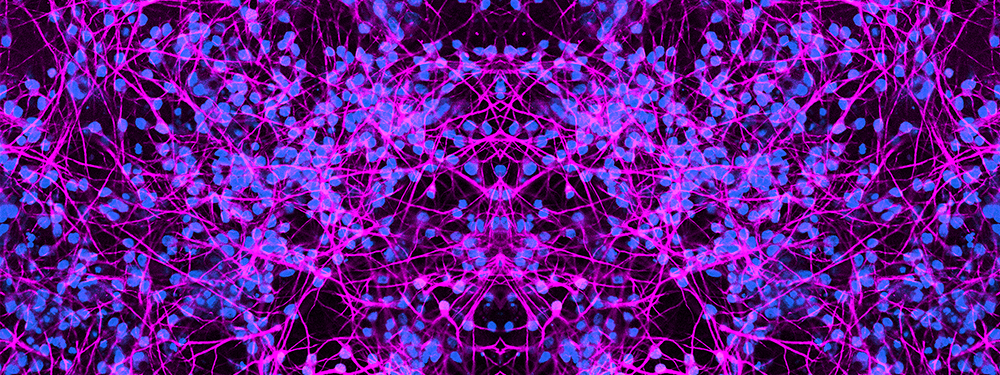
Led by Dr. Giovanni Manfredi, the research work in the Mitochondria and Neurodegeneration lab is focused on mechanisms of mitochondrial regulation and alterations that accompany neurodegenerative disorders, in which mitochondrial dysfunction is etiologically involved. The Mitochondria and Neurodegeneration lab includes 18 scientists. Faculty members share research interests and have different but complementary expertise. In addition to Dr. Giovanni Manfredi, Professor, the lab includes three Associate Professors of Research, Dr. Marilena D’Aurelio, who is an expert of metabolism in primary mitochondrial diseases, Dr. Alexander Galkin, an expert of mitochondrial bioenergetics and free radical production in ischemia, and Dr. Jordi Magranè, who is an expert of animal models of Friedreich ataxia. There are two Assistant Professors of Research Professors, Dr. Hibiki Kawamata, who is an expert of mitochondrial dysfunction in animal and cellular models of ALS, and Dr. Csaba Konrad, who is an expert of mitochondrial bioenergetics and bioinformatic approaches for functional analyses in ALS. The lab also includes two postdoctoral associates, Dr. Kevin McAvoy and Dr. Belem Yoval Sanchez, one Associate Research Scientist, Dr. Anna Stepanova, two neuroscience graduate students, Nneka Southwell and Nicole Sayles, and seven technical assistants.
The Mitochondria and Neurodegeneration lab investigates mitochondrial functional and structural alterations in genetic forms of primary mitochondrial diseases, ischemia reperfusion injury, and in genetic and sporadic forms of amyotrophic lateral sclerosis (ALS) and Friedreich ataxia. The systems utilized include animal and cellular disease models, such as primary neurons and induced pluripotent cells, as well as cells directly derived from patients. The overarching goals of the research are to understand disease mechanisms, discover disease biomarkers, identify therapeutic targets, and test novel therapeutic approaches for these disorders. Major active lines of research are focused on bioenergetic alterations and other aspects of mitochondrial pathophysiology, including intermediary metabolism, mitochondrial quality control, protein misfolding aggregation, calcium homeostasis, oxidative stress, and the interactions between mitochondria and other organelles. The research takes advantage of a variety of approaches to assess mitochondrial functions, such as mouse and cells models expressing genetically encoded reporters for live imaging, high-content imaging for cellular studies in primary patient cells and iPSC-derived neurons and glia, as well as immunocytochemical and ultrastructural studies ex vivo. Recent advancements have further expanded the scopes of the research, as the field has come to the realization that mitochondrial dysfunction is not simply a bioenergetic problem. The implications of mitochondrial dysfunction are, in fact, much broader, strongly implicating many aspects of metabolism. The research has now evolved to incorporate complex unbiased transcriptomics, proteomic, and metabolomics approaches, to generate and analyze large data sets to help to understand the mechanisms underlying mitochondrial stress responses, because maladaptive changes in metabolism in conditions of chronic mitochondrial dysfunction could play crucial roles in neurodegenerative diseases but also provide therapeutic targets and disease biomarkers.
The research in the Mitochondria and Neurodegeneration lab is involved in several productive collaborations within WCM, including with Drs. Steven Gross and Qiuying Chen in Pharmacology, Drs. Costantino Iadecola, Ping Zhou. and LI Gan in the BMRI, and Dr. Annarita Di Lorenzo in Pathology.
The research in the Mitochondria and Neurodegeneration lab is consistently well funded by grants from NIH, including R01 and R21 type grants as well as an R35 outstanding scientist award. The lab also receives funds through foundation grants, including the Muscular Dystrophy Association, Project ALS, and the Friedreich research Alliance, as well as industry sponsored research agreements. Notable recent scientific accomplishments of the researchers of the Mitochondria and Neurodegeneration lab with their collaborators are discoveries described in the following publications:
1) A coordinated multiorgan metabolic response contributes to human mitochondrial myopathy (EMBO Mol Med. 2023).
2) Sphingosine-1-phosphate controls endothelial sphingolipid homeostasis via ORMDL (EMBO Rep. 2023).
3) Effects of PB-TURSO on the transcriptional and metabolic landscape of sporadic ALS fibroblasts (Ann Clin Transl Neurol. 2022).
4) Gene expression profiles in sporadic ALS fibroblasts define disease subtypes and the metabolic effects of the investigational drug EH301(Hum Mol Genet. 2022).
5) Mutant CHCHD10 causes an extensive metabolic rewiring that precedes OXPHOS dysfunction in a murine model of mitochondrial cardiomyopathy (Cell Rep. 2022)
6) Tau interactome maps synaptic and mitochondrial processes associated with neurodegeneration (Cell. 2022).
7) Mouse midbrain dopaminergic neurons survive loss of the PD-associated mitochondrial protein CHCHD2 (Hum Mol Genet. 2022).
8) How many molecules of mitochondrial complex I are in a cell? (Anal Biochem. 2022).
9) Redox-dependent loss of flavin by mitochondria complex I is different in brain and heart (Redox Biol. 2022)